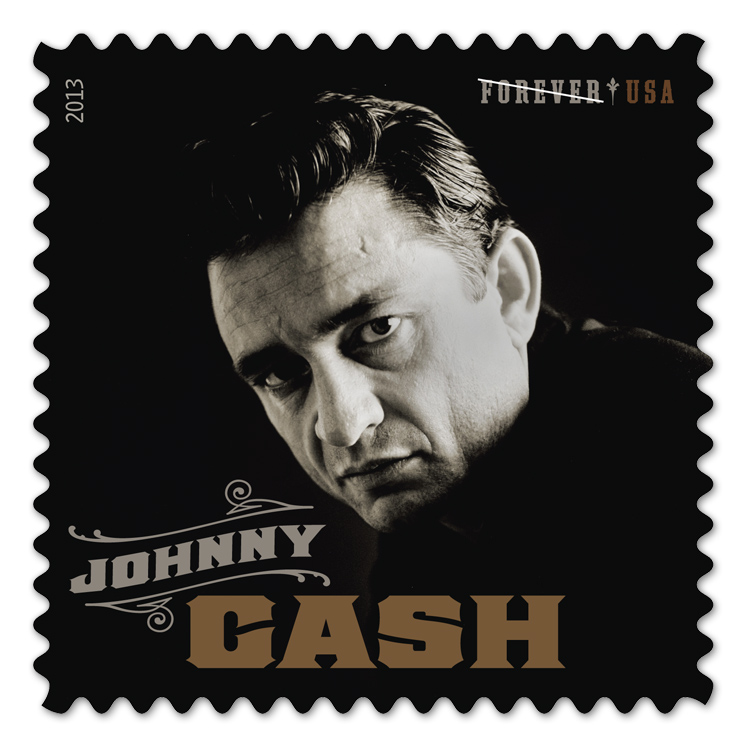
Johnny Cash (1932-2003) is best remembered internationally as a country
music artist, but we feel his influence just about everywhere—from rock
and folk to blues and gospel. The Johnny Cash (Forever®) stamp is being issued this year as part of the exciting new Music Icons stamp series.
Resembling the appearance of a 45 rpm record sleeve, the square stamp features a photograph taken by Frank Bez during the photo session for Ring of Fire: The Best of Johnny Cash (1963). In the photo, Cash stares out at the viewer through a veil of shadow, his brooding expression fitting for an artist known to so many people simply as “the Man in Black.”
Cash found inspiration for his music in the stories of outlaws and laborers, and in his own life experience. A child of the Depression, he grew up in rural Arkansas, and the culture of that time and place—especially the Bible and gospel and country music—remained with him all his life. Themes of redemption, loneliness, love, loss, and death colored his music with a gritty realism that differed markedly from other socially conscious popular music. “I shot a man in Reno just to watch him die,” he sings famously in “Folsom Prison Blues.”
By the 1960s, Cash had become one of the top names in country music, with a string of hits that included “Cry, Cry, Cry,” “I Walk the Line,” and the Grammy award-winning “A Boy Named Sue.” Though his popularity waned in the 1970s and 1980s, Cash made a remarkable resurgence in the 1990s, culminating in several more Grammy awards. He was inducted into the Country Music Hall of Fame in 1980 and the Rock and Roll Hall of Fame in 1992.
Resembling the appearance of a 45 rpm record sleeve, the square stamp features a photograph taken by Frank Bez during the photo session for Ring of Fire: The Best of Johnny Cash (1963). In the photo, Cash stares out at the viewer through a veil of shadow, his brooding expression fitting for an artist known to so many people simply as “the Man in Black.”
Cash found inspiration for his music in the stories of outlaws and laborers, and in his own life experience. A child of the Depression, he grew up in rural Arkansas, and the culture of that time and place—especially the Bible and gospel and country music—remained with him all his life. Themes of redemption, loneliness, love, loss, and death colored his music with a gritty realism that differed markedly from other socially conscious popular music. “I shot a man in Reno just to watch him die,” he sings famously in “Folsom Prison Blues.”
By the 1960s, Cash had become one of the top names in country music, with a string of hits that included “Cry, Cry, Cry,” “I Walk the Line,” and the Grammy award-winning “A Boy Named Sue.” Though his popularity waned in the 1970s and 1980s, Cash made a remarkable resurgence in the 1990s, culminating in several more Grammy awards. He was inducted into the Country Music Hall of Fame in 1980 and the Rock and Roll Hall of Fame in 1992.
Δεν υπάρχουν σχόλια:
Δημοσίευση σχολίου